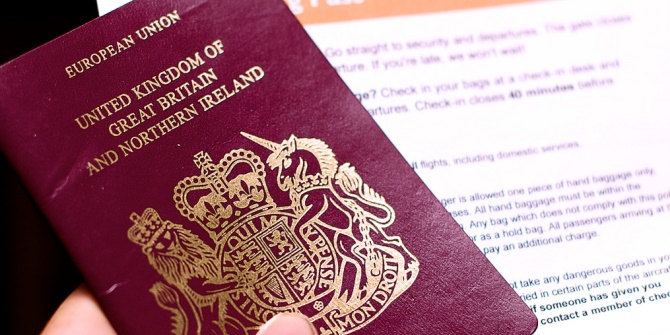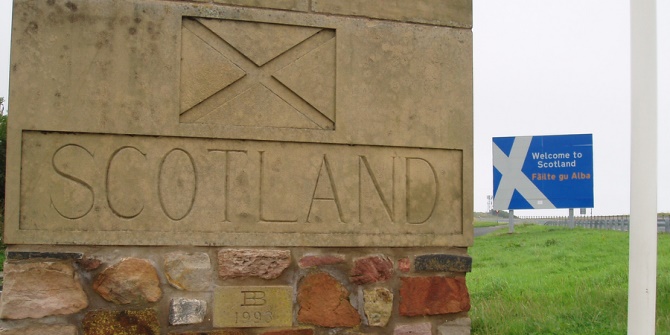 Far from delivering definitive answers, the outcome of the Scottish referendum has triggered a fundamental rethinking about the distribution of power within the UK. This comes at a moment when nation-states are increasingly torn between internal demands from regional institutions and the external pushes coming from international migration and supranational institutions like the EU. The result is citizenship-lite, with the model of a single, all-powerful political sovereign authority increasingly weakened, argues Lorenzo Piccoli.
Far from delivering definitive answers, the outcome of the Scottish referendum has triggered a fundamental rethinking about the distribution of power within the UK. This comes at a moment when nation-states are increasingly torn between internal demands from regional institutions and the external pushes coming from international migration and supranational institutions like the EU. The result is citizenship-lite, with the model of a single, all-powerful political sovereign authority increasingly weakened, argues Lorenzo Piccoli.
The referendum on the independence of Scotland has left many observers with more questions than answers. While it is now understood that Scotland will not be an independent country for the time being, a fundamental lack of clarity remains with respect to its future relationship with the rest of the UK. The question is not concerned only with the amount of authority that will be devolved, but also with its nature and purpose.
Part of the uncertainty is due to the rather peculiar campaign that led to the referendum. The Better Together campaign pleaded to deliver more powers to Scotland, recognizing that citizens living in Scotland can be better served by stronger Scottish institutions interacting with the central British government. This is not too dissimilar from the claims made by the pro-independence coalition, which advocated independence while also keeping five of the six unions Scotland is part of: the EU, the queen, the pound, society, and defense. In the course of the campaign, independence has been framed as a kind independence-lite, while in the last few weeks before the vote the case for the Union has quickly evolved into a case for a somehow different kind of Union.
The net result has been a convergence between the two campaigns, showing that ‘Independence’ and ‘Union’ are not binary concepts. This overlapping of the terms and confusion of the issues at stake explains why the referendum produced a somehow nuanced answer to an otherwise very straightforward question (‘Should Scotland be an independent country? Yes or no?’). As a matter of fact, far from delivering definitive answers, the outcome of the poll has triggered a fundamental rethinking about the distribution of power within the UK and constituted a powerful mandate for constitutional change.
This comes at a moment when nation-states are increasingly torn between internal demands from regional institutions and the external pushes coming from international migration and supranational institutions. The idea of a single, all-powerful political authority for each national community is increasingly under pressure. Nowhere is this clearer than in Europe, where the emergence of a powerful supranational institution like the EU has diminished the role of the nation-state in many crucial domains of public policy, from economic regulation to monetary policy and control over immigration. When the process of Europeanization is accompanied by demands of greater institutional recognition by the regions, as in the UK, nation-states are forced to cede important shares of their power to institutions that are both above and below the central level of government.
In this context, the fact that individual citizenship rights result from a nested structure composed of smaller communities that are contained within larger ones becomes the norm rather than an exception. Forms of strengthened autonomy within a greater multilevel ‘whole’ are somehow akin to the kind of architecture that characterized many sub-state political communities that existed before the rise of the nation-state. In polities like city-states and constituent part of multinational empires, one’s political status resulted from the combined effect of different levels of government. Then came the nation-state, where one’s citizenship status was produced by the direct and exclusive relationship between the individual and the institutions of the state. While traditional notions of absolute citizenship represented the ideal form of membership of modern nation-states, the redistribution of authority within and above nation-states is producing complex architectures where citizenship rights depend upon the interaction of different levels of government. National citizenship remains the core part of this multilevel whole, but it does not provide the full bundle of rights alone. This is why it makes increasing sense to think of contemporary national citizenship as citizenship-lite.
People in devolved regions of the UK already enjoy significantly different rights according to the choices of their regional institutions. The devolution of health, education, housing and social care has already resulted in a significant amount of policy divergence in the provision of individual rights. Some examples concern regional variations on the availability of fee waivers for higher education, free personal care for elderly people, social assistance for the homeless and for those with mental health problems. The decision of the majority of Scots to vote ‘No’ in the referendum may result in even more profound differentiation of citizenship not only in Scotland, but in the whole of the UK. Because keeping Scotland within an ever more decentralising Union is a more complex act of multi-level governance than splitting the UK, this is something that can be done only with an increasing lightening of national citizenship by shifting weights towards the UK’s constituent units. As the model of a single, all-powerful political sovereign authority is increasingly weakened, it seems about time to start considering citizenship-lite as the new real thing.
Note: This article gives the views of the author, and not the position of the British Politics and Policy blog, nor of the London School of Economics. Please read our comments policy before posting. Featured image credit: John O’Nolan CC BY 2.0
 Lorenzo Piccoli is a researcher at the Department of Social and Political Sciences at the European University Institute in Florence. He works on self-government and citizenship policies. He collaborates with the Italian NGO Unimondo.
Lorenzo Piccoli is a researcher at the Department of Social and Political Sciences at the European University Institute in Florence. He works on self-government and citizenship policies. He collaborates with the Italian NGO Unimondo.









I always thought of myself as British born and bred, and held a British Passport; then along came the internet and it seemed that I was required to state UK on everything. After the Scottish debacle I now consider myself to be English! As Britain further devolves I guess I will soon be just a Londoner!
The Scotish referendum was always contradictory because whilst it was for freedom from Rule by Westminster, where there are Scottish MP’s anyway and the real bonus would have meant freedom from Brussells as well, the SNP claimed they would immediately try to get Scotland into the Eussr thereby throwing away their freedom again to a foreign government.